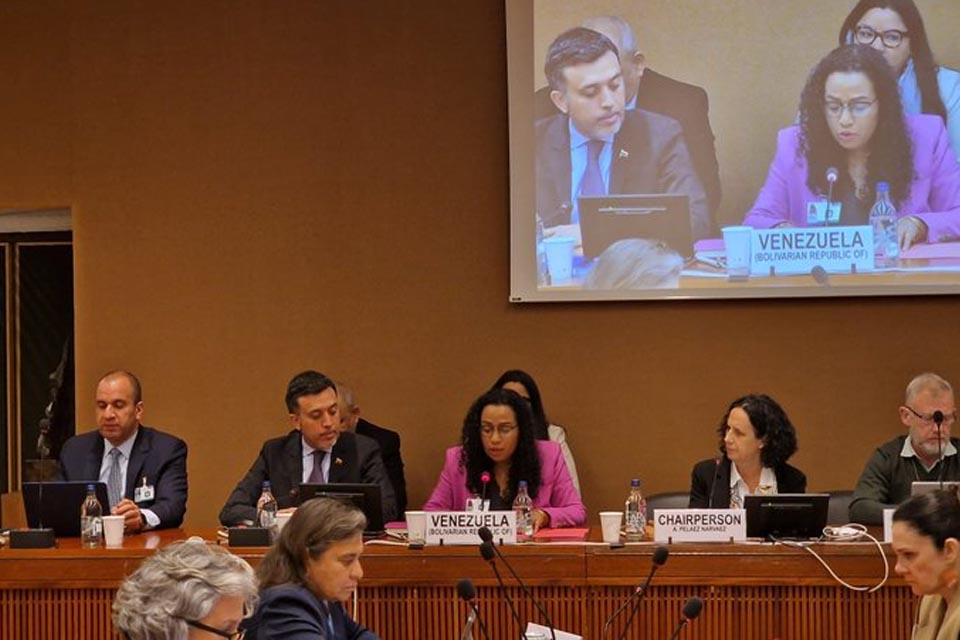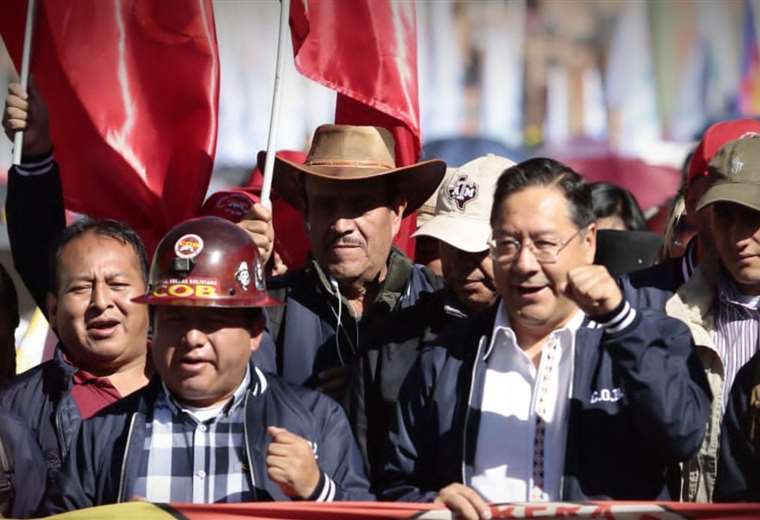The Venezuelan delegation at Cedaw was forced to acknowledge the continuous failures to reduce gender violence, provide an effective health system, care for victims of human trafficking, as well as indigenous peoples affected by mining activity in the south of the country
The administration of Nicolás Maduro presented this Thursday, May 18 its ninth periodic report before the Committee for the Elimination of Discrimination against Women (Cedaw), where they reported on the progress made on improvements in the rights of girls, adolescents and women in Venezuela from 2014 to the date.
Despite the fact that the Minister for Women and Gender Equality, Diva Guzman, defended the “feminist government” of Nicolás Maduro and condemned the impact of the sanctions in a differentiated way against women; both the official and the Venezuelan delegation were forced to acknowledge the continuous failures to reduce gender violence, provide an effective health system, care for victims of human trafficking, as well as indigenous peoples affected by mining activity in the south from the country.
During her initial speech, lasting just over 25 minutes, Minister Guzmán assured that the sanctions, for example, have prevented the purchase of parts for medical equipment, as well as the procurement of reagents for laboratories, surgical medical supplies, and vaccines.
He also denounced that nine million dollars, destined for the purchase of dialysis materials for 15,000 hemodialysis patients, were blocked; as well as the delays and blockades of international banks such as JP Morgan to cancel companies in the health sector, the PAHO Revolving Fund and the Covax vaccine system.
*Read also: NGOs denounce the systematic violation of women’s rights before the Cedaw
The minister also affirmed that six laws and decrees have been promulgated or amended, including the Organic Law on the Right of Women to a Life Free of Violence, the Care System Law and the Promotion Law for the use of Language with Gender Approach, on which there are still no regulations.
He said that work is currently underway to develop a law for humanized childbirth and breastfeeding, a law for the prevention of early pregnancy, and a law for attention to sexually transmitted infections.
He also highlighted the Patria System, of which he said at least 21 million Venezuelans are “registered voluntarily and without discrimination”, “where the main beneficiaries are women.”
Another piece of information provided by the minister is that 50.40% of the economically active population are women, “who also lead the sector of female entrepreneurs with more than 60%.”
Women, neglected health
Minister Diva Guzmán pointed out that last year life expectancy for women reached 79.23 years of life, “exceeding men by six points.” In addition, she said that of the 333,526 people with disabilities in the country, 47.46% are women who are being treated with medical supplies.
“We are developing the Humanized Childbirth and Breastfeeding Plan, which has 10,300 promoters, so far in 2023 the training and monitoring of 24,070 pregnant women during the lactation period has been carried out,” said the official.
During the interactive dialogwhere the Venezuelan delegation was questioned by different experts from Cedaw, the Vice Minister of Ambulatory Care Networks, Joicymar Rivas, assured that the country “has made significant progress in terms of health (…) women are definitely covered in access to health, we are a priority for the Venezuelan government.”
Regarding advances in sexual and reproductive rights, reduction in maternal mortality and adolescent pregnancy, Vice Minister Rivas mostly referred attention focused on talks to some communities, delivery of some contraceptive methods, training and updating for medical personnel and arrangements in 467 low-risk delivery rooms.
According to Rivas, through the university education system, 648 preventive sessions on sexual and reproductive health were held, although he did not specify if they only cover activities from last year. He also stated that 401,624 contraceptive methods were delivered last year, without specifying which ones.
373,262 of these contraceptive methods were delivered to women, which demonstrates the State’s conception that both sexual and reproductive responsibility falls on this sector of the population. It also specified that 28,662 contraceptives were delivered to adolescents.
The vice minister also highlighted that last year 58,192 women in critical condition were saved during their pregnancy, 404,054 live births were registered and 807,673 prenatal consultations were carried out. Regarding the Humanized Childbirth Plan, she referred to a 75% increase in vaginal deliveries in public centers accompanied by promoters of this mission.
*Read also: Having a humanized birth is a “matter of luck” in maternity hospitals in Caracas
Regarding the complaints of forced sterilizations, carried out by NGOs and cross-examined by an expert from Cedaw, the vice minister only referred that the law sanctions this type of violence against women and pointed out that anyone who undergoes this type of operation must sign a consent informed.
The official omitted during her interventions to refer to the situation of abortion in the country, which has one of the most restrictive laws in the region and criminalizes this medical practice in almost all grounds.
Regarding the care of women with HIV / AIDS or chronic diseases, Joicymar Rivas said that antiretroviral therapy “is 100% guaranteed to all registered users”, that there is “100% coverage of exams in pregnant women” and that the year last year they carried out 1,215 rapid tests on pregnant women to rule out HIV.
The deputy minister also blamed the sanctions for preventing international companies from maintaining medical equipment to improve care for people with cancer, especially women, in the country. She acknowledged that of 23 radiotherapy equipment, only five are operational, while 17 brachytherapy equipment are inoperative.
insufficient care
After the questioning of the Israeli expert Dafna Hacker -who had recent information in reports from the region- about the efforts and policies implemented by Venezuela to curb trafficking, prostitution and sexual exploitation of girls and women, especially migrants, the Vice Minister of Politics Interior and Legal Security, Alana Zuloaga, only mentioned that the victims are cared for in a specialized unit of the Public Ministry.
“We face the great challenge of being a migration of origin, with an induced migration that has exposed our men and women to trafficking networks, subjecting them to great torture, not only sexual but labor,” said Alana Zuloaga, who also recognized that the National Plan against Trafficking is not public.
*Read also: Venezuela, the origin of trafficking and the recruitment of the Aragua Train
“It is a crime that today surprises us as a country,” said the vice minister, who also explained that there is coordination with the National Office against Organized Crime, national security forces, such as the Cicpc, and international ones such as Interpol, in addition to the Public Ministry for provide support to victims of trafficking.
It also indicated that 190 officials have been prosecuted for omission or re-victimization against victims of gender violence. “We know that there are officials who do not comply.”
vulnerable women
The threats and intimidation by government actors against women human rights defenders were also dismissed by the Venezuelan delegation during the interactive dialogue at the 85th session of Cedaw. The executive secretary of the National Human Rights Council, Larry Devoe, said that their work is recognized and support is provided to organizations for it.
“The defenders can freely carry out their work” without acts of harassment, intimidation or threats, said Devoe, who did not refer to particular cases or the direct question about the effects on the work of non-governmental organizations through a bill that ahead of the National Assembly.
*Read also: #Profile Larry Devoe: the man who accumulates charges within the madurismo
In addition, he stated that in all cases where acts of harassment or intimidation are recorded, they are duly investigated by the Public Ministry through its Directorate of Fundamental Rights.
Regarding the so-called Law against NGOs, the Venezuelan delegation said that it is in a consultation period and “it only comes to accompany the work that non-governmental organizations are carrying out and to rule out, an important element, that these platforms are used for purposes other than They are not those that must be prescribed, therefore, it entails the elaboration of a great national registry and everything binding on this matter.
Regarding the situation of women deprived of liberty, the Vice Minister of Internal Policy and Legal Security, Alana Zuloaga, said that since 2011 they have maintained a policy of reintegration into society of those detained for various crimes. She affirmed that there are 4,554 women prisoners, which represents “only 8% of the total” of the prison population, in 17 prisons.
This figure is slightly higher than what was reported (4,117 detainees) by NGOs such as the Venezuelan Observatory of Prisons and A Window to Freedom in their 2022 reports.
While magistrate Lourdes Suárez Anderson defended that the special courts for attention to victims of gender violence are sufficient, despite the fact that she recognized that they are not created throughout the country and, in some cases, the cases are transferred to municipal courts, of which he did not say how effective it is in addressing this type of crime.
In addition, the magistrate of the Constitutional Chamber said that the TSJ has advanced in the recognition of the homoparental family, through a sentence, and the recognition of the identity of boys and girls of these couples, and avoided answering what are the policies that it intends to implement the Venezuelan State to fully recognize this type of family, as well as the identity of trans people.
Ambassador Héctor Constant acknowledged that Venezuela signed but is pending ratification of the minamata convention, referring to the impact of the use of mercury on health. In addition, he assured that there is an Indigenous Health Directorate, “which guarantees that there is a balance between commercial and traditional medicine (…) The State is pending to attend to any affectation to indigenous peoples, to be treated specifically.”
Post Views: 661







